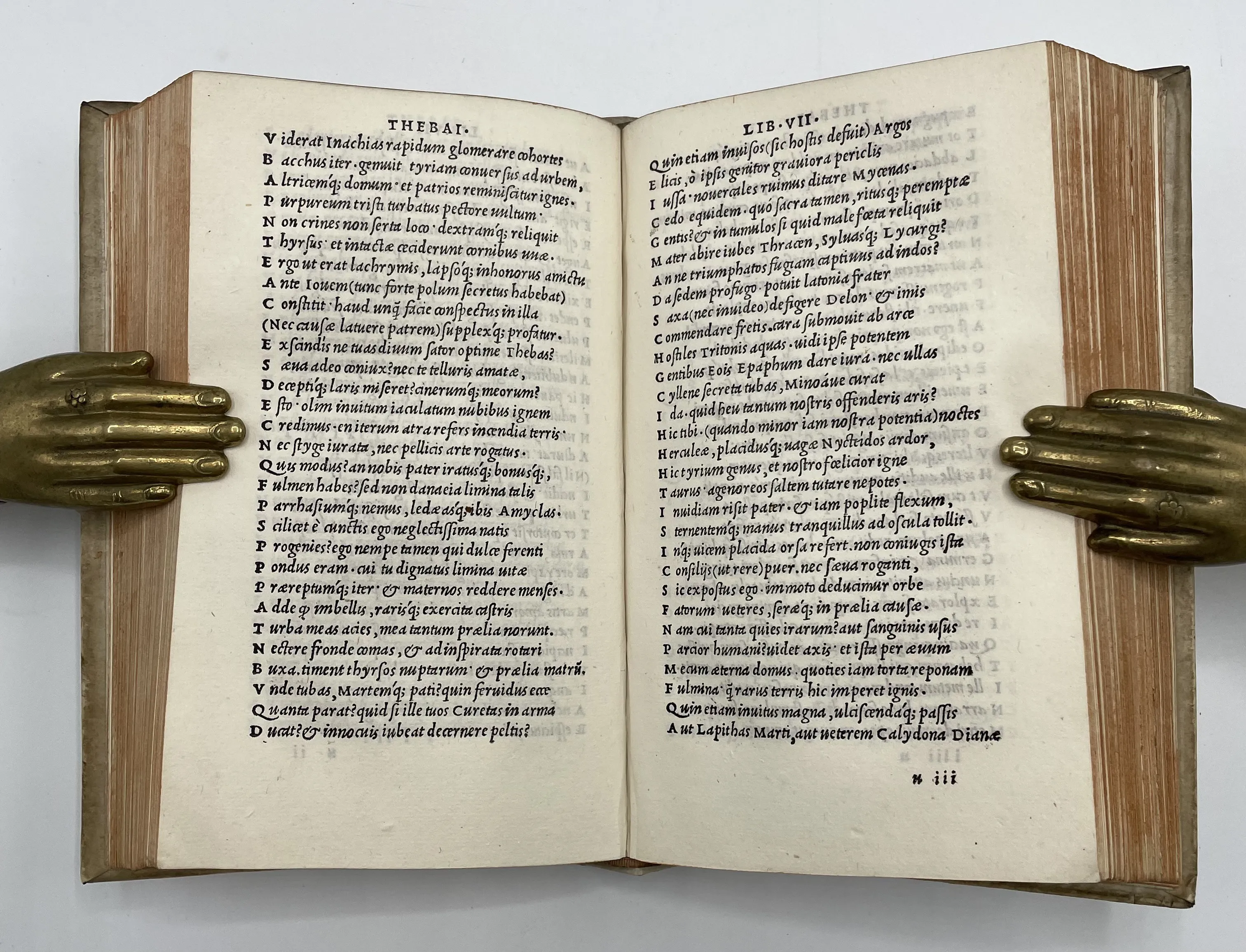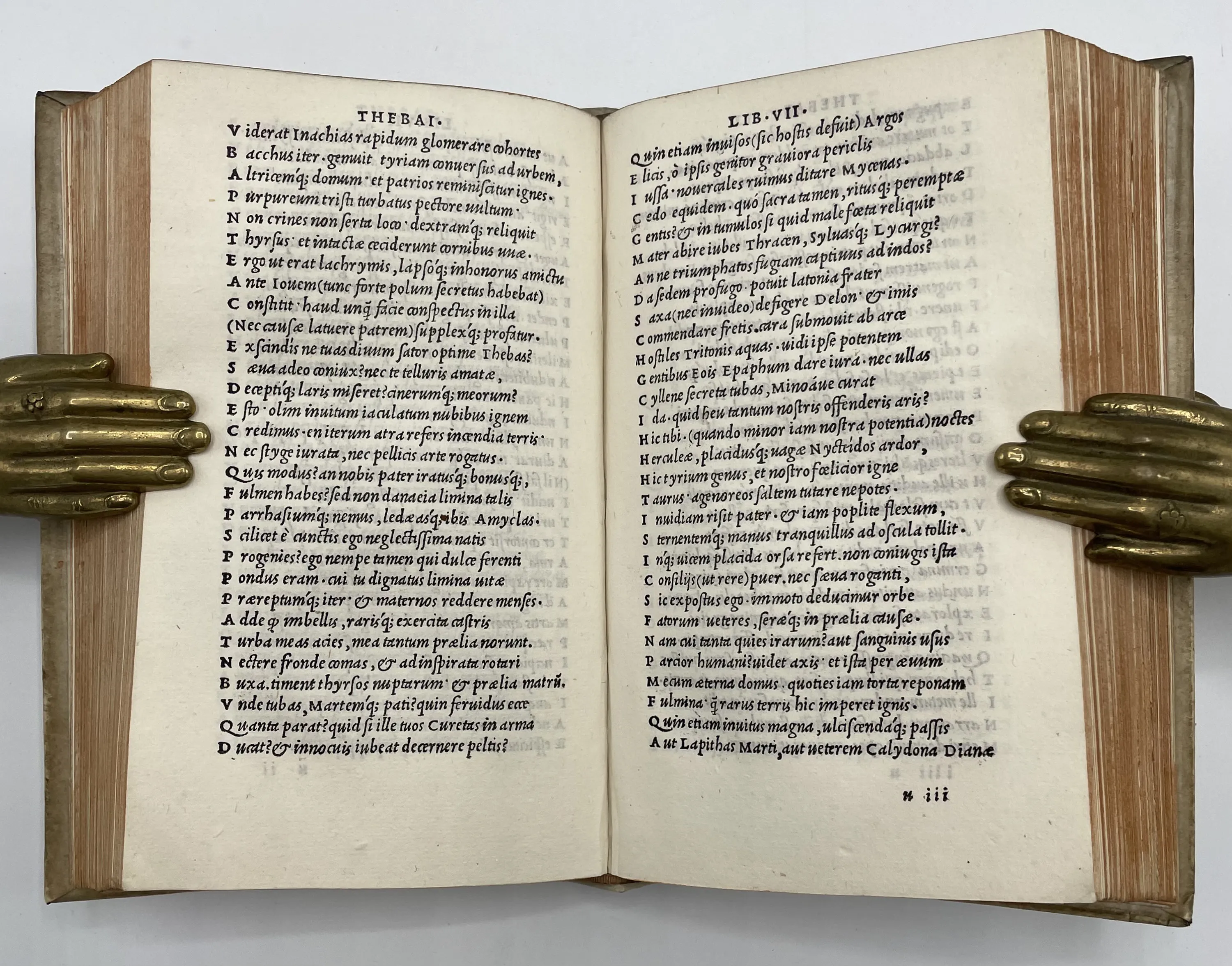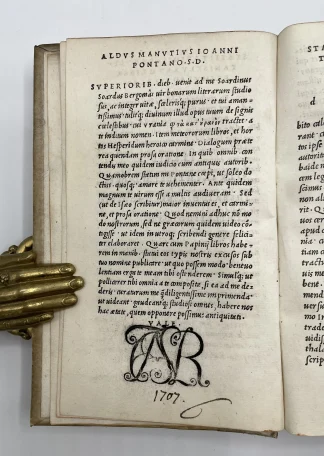STATIUS, Publius Papinius.
FROM NARCISSUS LUTTRELL’S LIBRARY
Sylvarum libri […] Thebaidos […] Achilleidos. [with] Orthographia et flexus dictionum graecarum.
[Venice, Aldus Manutius, August 1502].£8,500.00
FIRST ALDINE EDITION. 8vo. 2 works in 1, usually issued together, I: ff. [256]; II: [40]. I: Italic letter. II: Greek letter, double column, little Italic. Aldine device to last verso. First title a little dusty, second a trifle browned, small light, brownish rectangular stain to lower margin of last 3 ll. of I and first 3 of II, tiny hole to upper margin of first few ll. A very good, clean copy in c1700 vellum boards, C19 vellum reback, earlier morocco label remounted, upper margins a bit trimmed, a.e.r. C20 bookplate of Eric de Bellaigue to front pastedown, I: stamped cipher of Narcissus Luttrell to title verso, with ms ‘1707’, II: C16 autograph ‘Lazari Chalcei’ [Lazzaro Calcei] and C17 ‘Marq. Gudii’ [Marquard Gude] to title.
A good, clean copy, of illustrious provenance, of the first Aldine edition of Statius, complete with the ‘Orthographia’, often missing. From the library of the barrister, MP and bibliophile Narcissus Luttrell (1657-1732), MA St John’s College, Cambridge. He was the owner of a fine library with a focus on pamphlets and broadsides on current affairs, from the Popish Plot onwards, as well as early English poetry. ‘After his son Francis’s death in 1749, the library descended to Edward Wynne, son of a cousin, and much of it was sold as part of the sale of his library in 1786’ (Book Owners Online).
Marquard Gude (1635-89) was a German classicist and archeologist. In his many travels, he collected a vast array of Greek and Latin inscriptions which were published posthumously as ‘Antiquae inscriptiones’ (1731). His rich library was dispersed as far as Chatsworth, his books bearing the inscription ‘Marq. Gudii’. The nearly 500 mss in Gude’s possession were acquired by the Ducal Library at Wolfenbuttel as behest of its librarian, Gottfried Wilhelm Leibniz. The name ‘Lazzaro Calcei’ appears several times in archives in Lucca, Tuscany, in the late C17 and early C18, so it may be the same family.
The Latin poet Statius (1st cent. AD) was widely appreciated in the Renaissance for the breadth of his poetry, and read alongside Virgil, despite the greater obscurity and dense character of his verse. This first Aldine edition, corrected by Avanzi, comprises all of his extant works. ‘Sylvae’ is a collection of occasional poetry devoted to events such as the construction of an imperial statue, a wedding, baths, a tree, a eunuch’s hair, and so on. The epic poem ‘Thebaidos’ narrates the clash for power between two brothers for the throne of Thebes, after the death of King Oedipus. ‘Achilleidos’ should have been the story of Achilles from his youth to his death at Troy, but was left unfinished at Statius’ death. Aldus’ ‘Orthographia’, with a dedication to the humanist Marcus Musurus, lists alphabetically all the Greek loanwords used by Statius, providing Greek synonyms and Latin meaning.
Renouard 35:7; USTC 857455; Edit16 36141; Ahmanson-Murphy 61; Dibdin I, pp.367-8.







